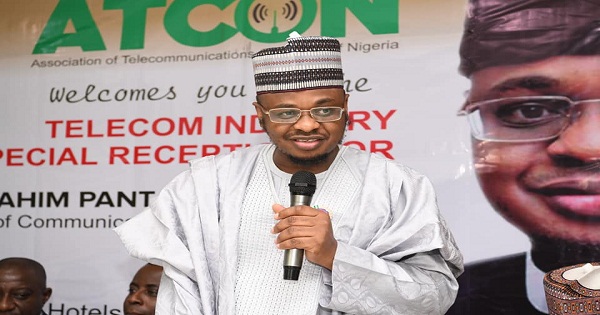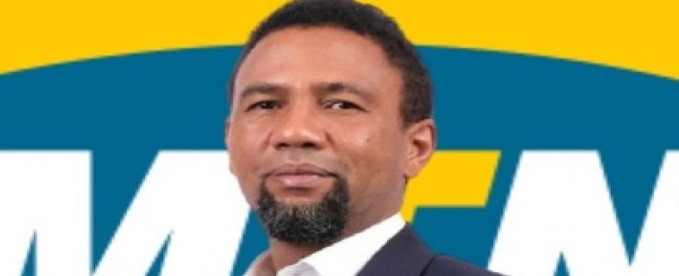Telecom
FG Displeased with State Government’s Over Increase of RoW charges

The Federal Government has frowns at the State Governments’ disregard of Right of Way (RoW) charge agreement.
Dr Isa Ali Ibrahim Pantami, Honourable Minister of Communications & Digital Economy, in a statement released on Tuesday expressed the ministry’s dismay on the decision of some states of the Federation to increase the Right of Way charges in disregard of the resolutions reached by the National Economic Council (NEC).
According to the statement, “We received with dismay the decision of some states of the Federation to increase the Right of Way charges in disregard of the resolutions reached by the National Economic Council (NEC).
“It may be recalled that in 2013, NEC set up a Committee comprising State Governors and Ministers to review the issues of multiple taxation in the telecommunications Industry in Nigeria and its impact.
“The Committee, after extensive and wide-ranging consultations, resolved to harmonize the taxes applicable to broadband related activities and streamline the taxation management processes across the Federation. Specifically, to deepen broadband penetration for the social and economic development of the country, the Committee agreed to the uniform Right of Way (RoW) charge of N145.00 per linear meter of fibre”.
Pantami also reminded Nigerians that in October 2019, the ministry wrote all the State Governors, drawing their attention to these resolutions and soliciting their support and collaboration towards the realisation of the National Digital Economy by fast-tracking the deployment of broadband infrastructure for the provision of affordable internet services to underserved and unserved areas.
“It is true that the digital economy today is strategically dominating the world economy. Oxford Economics puts the current value of the digital economy at $11.5 trillion which is about 16% of the world economy.
“Furthermore, the World Economic Forum revealed that 60% of the global economy is expected to be digitised by 2022. With the renaming of the Federal Ministry of Communications to Federal Ministry of Communications and Digital Economy as well as the unveiling of the National Digital Economy Policy and Strategy by Mr President, we are on the path of realising the potentials of the digital economy,” he said.
Pantami further described the actions of these Governors as disheartening, noting that it will impact negatively on the efforts being made by the Federal Government to deepen broadband penetration for the social and economic development of the country.
According to him, “It is however disheartening to hear that some States have decided to disregard these resolutions and have, in some cases, increased the RoW charges by over 1,200%.
“This will no doubt impact negatively on the efforts being made by the Federal Government. It is established that there is a strong correlation between a country’s broadband penetration and its Gross Domestic Product (GDP). An ITU study on Africa indicates that a 10% broadband penetration would result in an increase of 2.5% of GDP per capita.
The minister therefore called on all State Governors, especially those that have made public their decisions to increase the RoW charges, to reconsider these decisions in the interest of Nigerians as well as for the socio-economic growth and development of the country.
“We also draw their attention that these decisions, if implemented, will result in an increase on the costs of operations of the telecoms operators which will naturally be passed to the consumers,” he stated.
Telecom
PAT Taps Osi as CEO

Pan African Towers (PAT), a Nigerian infrastructure provider serving 9mobile and Spectranet, has appointed Echezona Osi as chief executive officer.

Echezona Osi
Adefolarin Ogunsanya, company’s, board chairman, explained in a statement that Osi would succeed Oladipo Badru, whose tenure lasted nine months in acting CEO position. Osi has more than 28 years of experience in the telecommunications sector across various regions of Africa.
Prior to his appointment as CEO, he had served as the head of network deployment at Airtel Nigeria, operations director and chief technical information officer at MIC Tanzania, chief technology officer roles at IPT PowerTech Nigeria, Rhino Niger Networks and Biswal Nigeria.
He obtained a degree in electrical/ electronic engineering from the University of Benin and a postgraduate diploma in data science and business analytics from the University of Texas.
Telecom
NCC Introduces N10m Licence Fee for Bulk SMS Service

Companies sending bulk international text messages, also known as Application-to-Person (A2P) messages, will now have apply for a licence that costs N10 million.

This is part of new rules introduced by the Nigerian Communications Commission (NCC) aimed at cleaning up the system, fighting fraud, blocking spam messages and stopping money from leaving the country unchecked.
These A2P messages are the kind customers get from banks, online stores, hospitals and political campaigns, automated texts sent from apps to their phones.
According to the commission, the bulk international text message system has been poorly regulated, allowing misuse and invasion of privacy.
“The International SMS Service Ecosystem in Nigeria has not been fully brought under regulatory control. It has been observed that the excessive use of the Short Message Service has led to fraud, spam and illegal activities,” the NCC said.
The regulator warned that without action, the problem would worsen as more people use mobile phones and digital services.
To solve this, the NCC is creating a central platform, or gateway, through which all international bulk text messages must pass through.
The agency said this would help to monitor messages in real time, ensure proper fees are paid, and make sure the money stays in Nigeria where it can contribute to the economy.
As part of the incoming change, service providers must follow strict rules, including strong data protection, spam filters, and message encryption.
Also, they must also work with local mobile networks and make sure all messages come from a verified sender
The NCC warned that any message without a proper sender ID will be blocked and not delivered to users.
To protect users from unwanted texts, the new rules say companies must get clear permission before sending any promotional content.
The rule also says people must also be able to choose whether they want to receive such messages or not.
Companies are now required to keep records of all messages for at least six months and must clearly state all charges involved.
The NCC said fees for help requests, cancellations, or service info must be transparent and not include hidden charges.
The commission will issue licences to several providers to encourage healthy competition but may limit new licences if needed.
Only companies that show they can stop fraud and safely deliver messages will be allowed to operate. They must also regularly report their message traffic and finances to the NCC.
It warned that any company that breaks the rules risks getting fined, suspended, or having its licence revoked.
Offences like charging illegal tariffs, ignoring security rules, or avoiding taxes will be punished, the NCC said.
The commission added that the new rules follow the Nigerian Data Protection Act 2023 and support the federal government’s goal of strengthening cybersecurity and controlling Nigeria’s digital space.
The framework will also be reviewed from time to time to keep up with new technology and market trends.
Telecom
MTN Nigeria Targets $1Bn Cloud Market with Largest Modular Data Centre

MTN Nigeria has launched what it claims is the country’s largest prefabricated modular data centre, marking a bold push into the country’s fast-growing cloud market and taking aim at global giants such as Amazon Web Services, Microsoft Azure and Google Cloud.

Karl Toriola, CEO, MTN Nigeria.
The shift comes as demand for cloud services in Nigeria soars — driven by the uptake of mobile apps, fintech tools and e-learning platforms — while foreign providers have become costlier in the wake of the naira’s sharp devaluation.
“This is one of the biggest data centres in West Africa and probably one of the biggest in Africa,” said Karl Toriola, CEO, MTN Nigeria.
He described the new Tier III-certified facility, with locally hosted cloud services, as “transformative for the technology ecosystem in Nigeria and very supportive of the federal government’s agenda”.
MTN Nigeria, the country’s largest telecoms provider, has so far invested $120m in the first phase, delivering an IT load of 4.5MW. A second phase, set to double capacity to 9MW, is budgeted at $135m.
“We already have data centres that are running our existing capacities,” Toriola said.
“We will go to 9MW in short order, possibly 14MW, and we can expand even further.”
He said the facility would allow local hosting for tech developers, large enterprises including banks and oil companies, and government agencies — markets long dominated by foreign cloud providers.
“Multinational companies such as Netflix, Facebook and Instagram can also host a lot of their data here. That improves the quality of service and reduces the cost of storage,” he added.

 Broadcasting2 days ago
Broadcasting2 days agoNigeria Week Ahead: Inflation, Oil and Naira in focus

 News2 days ago
News2 days agoEFCC: Accusations Against Our Chairman Are Baseless and Misleading

 Telecom17 hours ago
Telecom17 hours agoMTN Nigeria Targets $1Bn Cloud Market with Largest Modular Data Centre

 General News17 hours ago
General News17 hours agoWoodhall Capital and Partners Launch ₦1.5Bn Fund

 E-Business17 hours ago
E-Business17 hours agoFirm Highlights Top Risks of Quantum Computing

 General News17 hours ago
General News17 hours agoAM Best Reaffirms Stable Outlook for Cyber Insurance Market

 Telecom17 hours ago
Telecom17 hours agoNCC Introduces N10m Licence Fee for Bulk SMS Service

 News17 hours ago
News17 hours agoExperts Urge MSMEs to Build Strong Partnerships in Solving Problems,





















